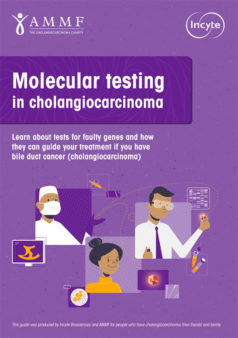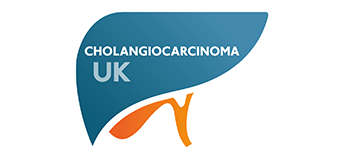Molecular Profiling and Targeted Therapies
No two tumours are exactly the same. The genetic characteristics of a cancer will vary from one patient to the next, which means that even patients with the same type of cancer may respond differently to the same treatment.

(Image from Professor J Valle’s presentation to AMMF)
Molecular profiling is the classification of samples (eg, tumour tissue) based on gene expression. Biopsy samples are sent to a laboratory where they undergo tests to analyse tumour DNA and proteins – the results of these tests provide information about the molecular profile of the tumour and can be used to help decide which treatments the cancer is likely to respond to. Molecular profiling may allow patients to benefit from more ‘personalised’ treatments, or ‘precision’ medicine.

(Image from Professor J Valle’s presentation to AMMF)
Certain gene mutations, including IDH1 and FGFR2, are each found in 10–15% of intrahepatic cholangiocarcinomas (CCAs), and treatments that target these are being trialled.
Update 22 July 2021: NICE has now approved pemigatinib (Pemazyre®) for those with cholangiocarcinoma who have an FGFR2 fusion. Pemigatinib is the first ever targeted therapy approved for CCA. This approval will not only give those eligible patients in England and Wales access to an alternative to chemotherapy, but importantly this new NICE guidance now means molecular profiling will be mandated as standard of care, and so opens the door for all those diagnosed with cholangiocarcinoma to have molecular testing carried out.
To see the short animated film, ““Cholangiocarcinoma and the importance of molecular testing”, presented for the first time at AMMF’s 2021 conference, click here
For available clinical trials, including those using molecular profiling and targeted therapies, see: https://ammf.org.uk/clinical-trials/
For the National Genomic Test Directory for Cancer, see: https://www.england.nhs.uk/publication/national-genomic-test-directories/
The animated film, “Cholangiocarcinoma and the importance of molecular testing” is now available in English, French, German and Polish:
For French, click here
For German, click here
For Polish, click here
A booklet, Molecular testing in cholangiocarcinoma” is now available. This explains about tests for faulty genes, and how these genes can guide treatment for those with cholangiocarcinoma.
Available to download, by clicking here
Printed copies are available from AMMF. Please email: info@ammf.org.uk
Back to previous page







